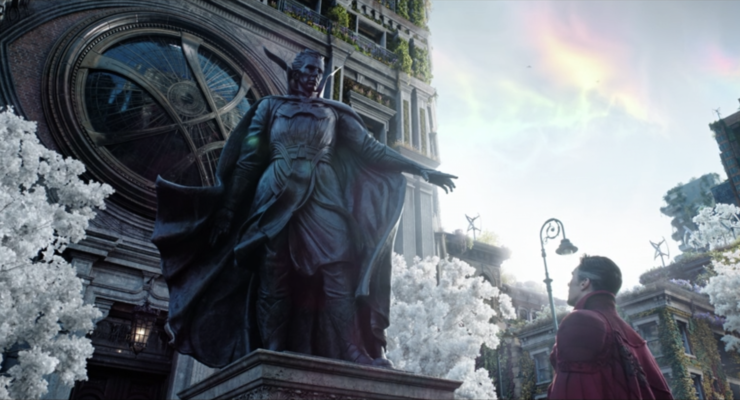From August 2017 – January 2020, Keith R.A. DeCandido took a weekly look at nearly every live-action movie based on a superhero comic that had been made to date in the Superhero Movie Rewatch. In this latest revisit we’ve covered some older movies—It’s a Bird… It’s a Plane… It’s Superman!, Mandrake, and the two Timecop movies—and two December 2021 releases—Spider-Man: No Way Home and The King’s Man—we finish off with the first three 2022 movies: The Batman, Morbius, and now the latest Doctor Strange flick.
The concept of the multiverse has been all over Phase Four of the Marvel Cinematic Universe. After Avengers: Endgame gave us the notion of alternate time tracks and Spider-Man: Far from Home had Mysterio using the concept as part of his long con to end Phase Three, we’ve gotten the multiverse spelled out in Loki, explored in more depth in What If…? season one, and serving as the plot catalyst in Spider-Man: No Way Home.
In Doctor Strange in the Multiverse of Madness, it is the plot…
There was pretty much always going to be a second Doctor Strange movie, especially given that the character became a significant presence in the MCU with his appearances in Thor: Ragnarok, Avengers: Infinity War, Avengers: Endgame, and Spider-Man: No Way Home—though the original intent was for this movie to come out before the Spidey film, so that Strange could use his experiences with the multiverse in this film to help him deal with the mishegoss in the Spidey film. The apocalypse of 2020 messed with productions schedules of both movies, so instead, No Way Home was an awkward intro to the multiverse that gave Strange at least a little prep for this story…
Several elements from the comics are introduced here, starting with the notion of the Scarlet Witch as a powerful bad guy. Wanda Maximoff was actually first seen as a villain in X-Men #4 by Stan Lee & Jack Kirby way back in 1964, a member of Magneto’s Brotherhood of Evil Mutants alongside her brother Pietro, a.k.a. Quicksilver, as well as Mastermind, and the Toad. But she and her brother reformed and joined the Avengers along with Hawkeye as part of “Cap’s Kooky Quartet” in Avengers #16 by Lee & Kirby in 1965. In a 1979 storyline that ran from Avengers #181-187 by David Michelinie, Mark Gruenwald, Steven Grant, & John Byrne it was established that Wanda and Pietro were raised on Wundagore Mountain, home of the High Evolutionary. Wanda was also established as having been trained in magic by Agatha Harkness and was an enemy of the first demon, Chthon (Marvel’s version of H.P. Lovecraft’s Cthulhu).
In the Vision & The Scarlet Witch miniseries from 1985-1986 by Steven Englehart & Richard Howell, Wanda used magic to enable her and Vision to have children, twins named Tommy and Billy. However, in John Byrne’s 1989 Avengers West Coast run, Vision was dismantled and reconstructed as an emotionless automaton by the government, and shortly after that, Tommy and Billy were revealed to be constructs created by the demon Mephisto. Losing her children caused a psychic break that forced Harkness to block Wanda’s memory of the children, but it came back and caused her to go on a trauma-induced rampage in Avengers #500-503 in 2004 by Brian Michael Bendis & David Finch.
This movie also introduces the character of America Chavez. First appearing as a member of the Teen Brigade in the 2011 Vengeance miniseries by Joe Casey & Nick Dragotta, using the codename Ms. America, Chavez can harness interdimensional energies, and one of her abilities is to travel between universes.
The Darkhold was first introduced in the Werewolf by Night storyline that ran through Marvel Spotlight #2-4 in 1972 by Gerry Conway, Roy Thomas, Dann Thomas, & Mike Ploog, and continued into the first three issues of Werewolf by Night by Conway & Ploog. A book of black magic spells created by Chthon, it has been a source of evil in the comics ever since, including being linked with Wanda more than once, and was also seen in season four of Marvel’s Agents of S.H.I.E.L.D.
The Illuminati was a secret society of powerful superhero who were leaders (Iron Man, Professor Xavier, Black Panther, Namor the Sub-Mariner, Reed Richards) who had met in secret for years sharing information.
Two of Strange’s disciples from the comics make brief appearances in this movie: Clea and Rintrah. Clea was introduced in Strange Tales #126 by Lee & Steve Ditko in 1964 as a person who lived in the Dark Dimension ruled by Dormammu. She would later become Strange’s disciple and lover, and in a storyline that ran through the Roger Stern-written issues of Doctor Strange from 1982-1985 would lead a rebellion against Dormammu’s sister Umar to rule the Dark Dimension. Rintrah appeared during Peter B. Gillis & Chris Warner’s run on Doctor Strange in 1986 as an apprentice to Enitharmon the Weaver, and after assisting Strange against the demon Urthona became the sorcerer’s apprentice. (Ahem.)
Doctor Strange director Scott Derrickson and writer C. Robert Cargill were originally set to return for this sequel when it was announced in 2019, but they both left over creative differences. Michael Waldron—the head writer on Loki, the TV series that codified the multiverse—and Sam Raimi—returning to superhero films after the bad word of mouth on Spider-Man 3 in 2007 made him run away from the genre—were brought in to write and direct. The latter was willing to come back to superhero films for this in part due to his longtime fandom for Doctor Strange, his respect for and enjoyment of what Derrickson did in the 2016 film, and—unsurprisingly for the mind behind Evil Dead and its various sequels and spinoffs—was all-in for the horror-tinged film that Marvel Studios wanted to go for with this film. (Cargill and Derrickson were also all-in for that, which makes you wonder what the actual creative differences were.)
Production was scheduled to start in the spring of 2020, but then the spring of 2020 happened. (Raimi and Waldron were reportedly relieved at the delay—if not, one hopes, the reason for it—as it gave them more prep time.) After initially being set for release in the spring of 2021, it finally showed up in theatres one year later.
Back from No Way Home are Benedict Cumberbatch as four different versions of Doctor Stephen Strange and Benedict Wong as Wong. Back from WandaVision are Elizabeth Olsen as two different versions of Wanda Maximoff, Julian Hilliard as Billy Maximoff, and Jett Klyne as Tommy Maximoff. Back from Doctor Strange are Rachel McAdams as two different versions of Christine Palmer, Chiwetel Ejiofor as a version of Karl Mordo, Topo Wresniwiro as Hamir, and Michael Stuhlbarg as Doctor Nicodemus West. Back from Avengers: Endgame (by way of What If…?) is Hayley Atwell as a version of Peggy Carter. Back from Logan is Sir Patrick Stewart as a version of Professor Charles Xavier. Back from Captain Marvel is Lashana Lynch as a version of Maria Rambeau. Back from Marvel’s The Inhumans is Anson Mount as a version of Black Bolt.
Introduced in this film are Xochitl Gomez as America Chavez, John Krasinski as a version of Reed Richards, Sheila Atim as Sara, Adam Hugill as the voice of Rintrah, Bruce Campbell (who I believe is contractually obligated to appear in every Sam Raimi film) as Pizza Poppa, and Charlize Theron as Clea.
Wong will next be seen in She-Hulk: Attorney-at-Law. While a title card at the movie’s end says that Doctor Strange will return, it’s not yet clear when Cumberbatch will next be seen, especially since two Avengers films (which involve Kang as at least one of the bad guys) have been announced and the next Strange film hasn’t been. It’s also not clear if Krasinski will be playing Reed Richards in the forthcoming Fantastic Four film.
“Are you happy?”
Doctor Strange in the Multiverse of Madness
Written by Michael Waldron
Directed by Sam Raimi
Produced by Kevin Feige
Original release date: May 6, 2022
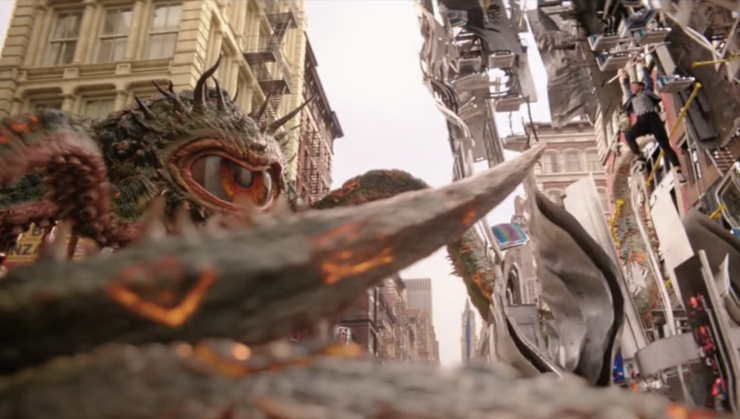
In the Gap Realm between universes, a version of Stephen Strange with a ponytail and America Chavez are being chased by a monster. They’re trying to reach the Book of Vishanti, but the monster stymies their efforts. Chavez has the ability to travel between universes, but can’t control it. Wounded, and desperate to defeat the monster, Strange starts to take Chavez’s power—which will kill her—but the monster stabs him in the heart before he can finish the job. The monster grabs Chavez, and the fear of being taken by it is enough to get her to open one of her star-shaped portals between universes. With his dying breath, Strange slices off the monster’s arms, freeing Chavez. However, Chavez, Strange, and the monster all fall through the portal—
—and then the mainline Strange wakes up from the nightmare.
Strange wakes up, puts on a suit, and goes to the wedding of Christine Palmer. He sits next to his ex-colleague Nicodemus West, who was also dusted during the blip, and he asks Strange if that really was the only option. Strange assures him that it was, and West bitterly says that that figures—he’s the best surgeon and the best superhero. But he still didn’t get the girl.
During the reception, Strange and Palmer chat—Palmer mentioning that her new husband is actually a huge fan of Strange—and Strange says he’s glad that Palmer is happy. When she asks if he’s happy, he insists he is.
At the sound of screams and things breaking, Strange and half the wedding guests run out to the terrace to find that something invisible is smashing things. Strange enters the fray, his suit changing to his sorcerer outfit and cloak. He makes the attacker visible, and it’s a giant multi-limbed creature with a giant eye at its center.
Wong portals in from Kamar-Taj and the two of them continue to fight the monster, who is after a young woman that Strange recognizes from his dream as Chavez. After the creature is finally defeated—by Strange ripping its eye out, ew—Chavez, Strange, and Wong sit down in a restaurant to talk. (Well, after Chavez tries to run away, having stolen Strange’s “slingie.” Apparently, they all realized how doofy “sling ring” sounds and called it “slingie” twice in this scene and never referenced it aloud again, thank goodness.)
Chavez explains that monsters who work for demons have been chasing her. She has the power to traverse universes. The dream Strange had was something that actually happened to her. The going theory is that dreams are windows into alternate-universe versions of oneself.
To prove that what she says is true, Chavez takes them to a rooftop where the corpse of Ponytail Strange landed. Chavez and Ponytail Strange were trying to get the Book of Vishanti, which Strange says is a myth, but Wong informs him it’s actually real. But, unlike Ponytail Strange, they don’t know how to reach it.
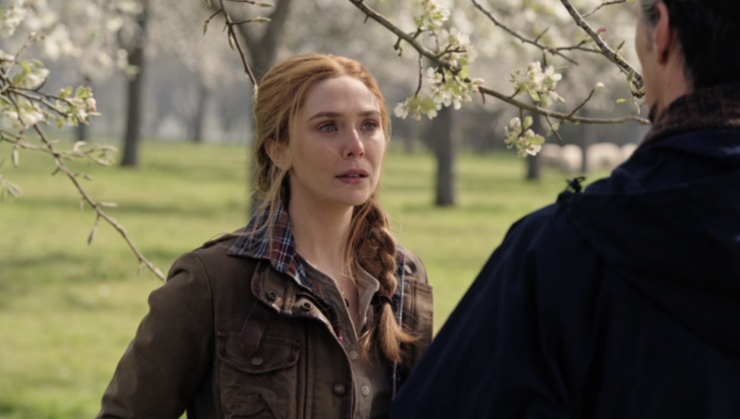
Strange and Wong bury the body in the stones of the roof, and then mention that the creature they fought had runes on it—that means a witch. Luckily, Strange knows one of those to ask for help. Wong takes Chavez to Kamar-Taj while Strange heads to Wanda Maximoff’s cabin (the one she buggered off to in the final episode of WandaVision’s first season).
Maximoff wakes up from a dream about spending time with her children Billy and Tommy in a suburban house and is tending to her trees when Strange arrives. He assures her that he’s not there to give her shit about Westview, and that he wants an Avenger’s help. (When Maximoff says there are other Avengers, Strange says that, given a choice between “the archer with the mohawk and several bug-themed crime fighters, or one of the most powerful magic wielders on the planet, it’s an easy call.”) However, when Maximoff suggests bringing Chavez to her for protection, Strange realizes that she’s the one who sent the monsters—Strange had never told her Chavez’s name. And Strange didn’t figure that out until after he told Maximoff that Chavez was at Kamar-Taj.
Maximoff drops the Hex she was using and it turns out that her getaway spot is full of darkness and dead trees—and the Darkhold, the book of black magic created by the first demon Chthon. She wants to use Chavez’s power to go to a universe where her children are truly alive, rather than fictional as they were in Westview.
Strange returns to Kamar-Taj, saying that the Maximoff they knew is gone, corrupted by the Darkhold. Wong, Strange, the acolytes at Kamar-Taj, and sorcerers from all over the world (and beyond, based on the look of some of them) fortify Kamar-Taj. Maximoff asks for Chavez to be handed over peacefully. This, she says, is her being reasonable. Once Strange makes it abundantly clear they will not hand over an innocent teenager to be killed by a witch corrupted by dark magic, Maximoff attacks. Several of the acolytes and sorcerers are killed, and Strange’s attempt to trap her in the Mirror Dimension only serves to delay her.
Maximoff forces Chavez to open a portal, but Strange jumps through it with Chavez, closing it before Maximoff can use it. They bounce through about a dozen or so different universes (including one where they’re entirely made of paint) before landing in one. In this world, the sky is full of rainbows, red means go and green means stop, and the signs are written in an unfamiliar language. Strange wants Chavez to get them home, as Wong is now alone with Maximoff, but Chavez can’t control her powers.
A food vendor named Pizza Poppa accuses Strange of doing Doctor Strange cosplay, thinking he stole the outfit from the Strange Museum—his harassment eventually leads Strange to cast a spell that makes Pizza Poppa punch himself in the face repeatedly.
On their way to find this universe’s Strange, and perhaps a way to find the Book of Vishanti, they find a device that can play a memory for you. Chavez sees when her powers suddenly manifested as a child, accidentally sending her mothers to another universe, and Chavez herself to a different one. She’s been trying to find her mothers ever since.
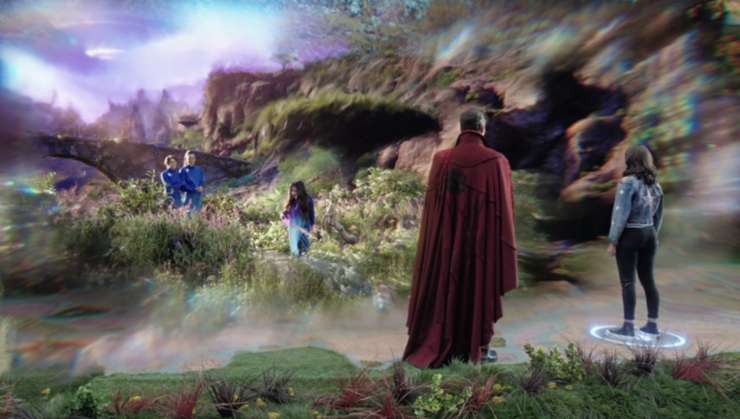
Strange sees the memory of when Palmer gave him a watch as a present—the same watch Strange still has in the sanctum, even though its face is cracked. Chavez asks if he blew his chance with Palmer in his universe—Ponytail Strange and Palmer weren’t able to work things out. Strange answers in the affirmative.
They arrive at the Sanctum Sanctorum to find a statue of Stephen Strange, with a plaque saying that he was Earth’s Mightiest Hero and he gave his life to stop Thanos. His replacement as keeper of the sanctum is Mordo. Strange is worried, since Mordo is now his mortal enemy back home, but this Mordo welcomes him as a brother.
Mordo explains that the Darkhold has one particularly nasty spell that Maximoff might use: dreamwalking, inserting yourself into your alternate self in another universe. However, Mordo also has access to the Book of Vishanti. But before Strange can ask how he can get at it, Strange and Chavez both collapse, having been roofied by Mordo’s tea.
They wake up in containment units, Strange wearing bracelets that neutralize his magic, his cloak nowhere to be found. They’re being examined by this universe’s version of Palmer, who took the job of being in charge of multiversal stuff at Strange’s funeral. As visitors from another reality, they could have weird contagions or other odd things, so they have to be examined.
Mordo then brings Strange before the Illuminati, a team of heroes charged with safeguarding this universe from multiversal incursions: besides Mordo, there’s Captain Carter, the First Avenger (Peggy Carter enhanced by the super soldier serum and with a shield decorated with a Union Jack); Captain Marvel (Maria Rambeau, having evidently been the one exposed to the Tesseract instead of Carol Danvers in this universe); Reed Richards of the Fantastic Four; Professor Charles Xavier of the X-Men; and Black Bolt of the Inhumans. Their seventh member was their Stephen Strange, and Xavier reveals the truth to Strange: he tried to use the Darkhold to stop Thanos, and failed. Later, the team as a whole used the Book of Vishanti to stop Thanos, which succeeded. But they then chose to execute Strange for his crimes, which was done by Black Bolt, saying “I’m sorry” with his powerful voice.
Back at Kamar-Taj, one of the sorcerers, Sara, sacrifices her life to destroy the Darkhold before Maximoff can use it. However, under threat of Maximoff torturing the surviving sorcerers, Wong admits that the Darkhold is just a copy. The original is inscribed on the walls of a cave in Wundagore Mountain. Wong takes Maximoff there, and several leviathans come to life and do her bidding when she arrives. She also tosses Wong off the mountain cliff.
Maximoff dreamwalks into the Maximoff of the universe Strange and Chavez are in and attacks the Illuminati stronghold, making short work of the Ultron sentries. Xavier informs Strange that they have access to the Book of Vishanti, should the Illuminati fall.
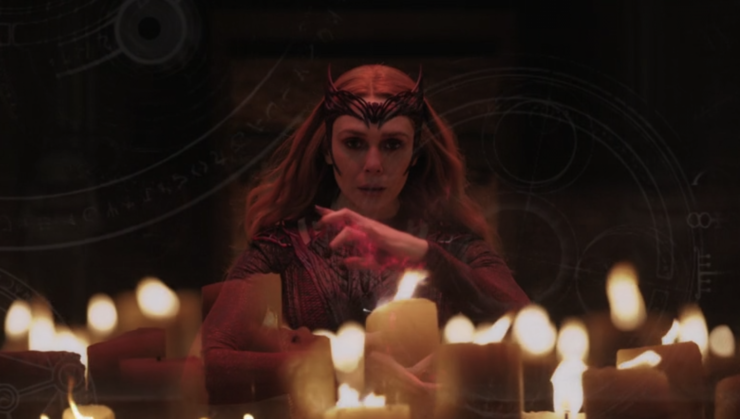
The Illuminati initially try to talk Maximoff down, but she covers Black Bolt’s mouth which causes his voice to double back on itself and blow out his skull, then kills Richards. Carter and Rambeau put up a much better fight (mostly by virtue of their tag-teaming her instead of standing around with their thumbs up their asses while their fellows get killed), but eventually Maximoff bisects Carter with her own shield and drops a statue on Rambeau. (How the latter is able to kill someone as powerful as Rambeau is left as an exercise for the viewer.) Xavier then fights a psi-war with her, also trying to free this universe’s Maximoff from the mental prison she’s in, but he fails and is also killed.
Strange goads Mordo into a fight, and Strange is able to escape and finds Palmer and Chavez, who are running from Maximoff. The cloak finds Strange, and then he asks Palmer for access to the Book of Vishanti. Palmer reluctantly agrees, at least in part because Chavez vouches for his not being as bad as this universe’s Strange.
A bloody, limping Maximoff stumbles very slowly after them, and keeps up with them, despite the three of them running. They arrive at the Gap Realm, but Maximoff arrives and grabs Chavez before Strange can make use of the Book of Vishanti, which she then destroys. She uses Chavez’s powers to zap Strange and Palmer to another universe. (Why she doesn’t just kill them like she did the Illuminati is also left as an exercise for the viewer.)
The world they land on is falling to pieces—buildings coming apart, cars floating, snow and rain everywhere, the sky on fire, dogs and cats living together, mass hysteria. Strange and Palmer track down that universe’s Strange, whose sanctum is in the midst of a barren field. This universe’s Strange was corrupted by the Darkhold—which he keeps on his belt—and he’s gone to other universes to kill other Stranges. He also now has a third eye on his forehead. The pair of them fight, and Strange is able to get the upper hand, blowing his counterpart out the window, where he’s impaled on the fence.
Maximoff uses Chavez’s powers to open a portal to Wundagore Mountain in her own universe and throws Chavez through, then ends the dreamwalk. She binds Chavez and prepares to yank her power. Meanwhile, the other Maximoff beats a hasty retreat to her house to make sure her kids are okay.
Strange now needs to use the Darkhold to dreamwalk into the only Strange still in his home universe: the corpse of Ponytail Strange. Unfortunately, animating a corpse violates all manner of natural laws, and so the souls of the damned will go after him for doing so. Palmer guards his corporeal body while Zombie Strange heads to Wundagore. Wong also climbs back up the mountain to help him out and the two of them try to stop Maximoff. Wong contains Maximoff for a bit, and Zombie Strange uses that opportunity to convince Chavez that she can control her powers: every time she opened a portal, it took her to where she most needed to go.
Thus encouraged, she attacks Maximoff just as she breaks out of Wong’s container. After they go back and forth, Maximoff starts to get the upper hand, but then Chavez decides to give her what she wants, and sends her to the other Maximoff’s house.
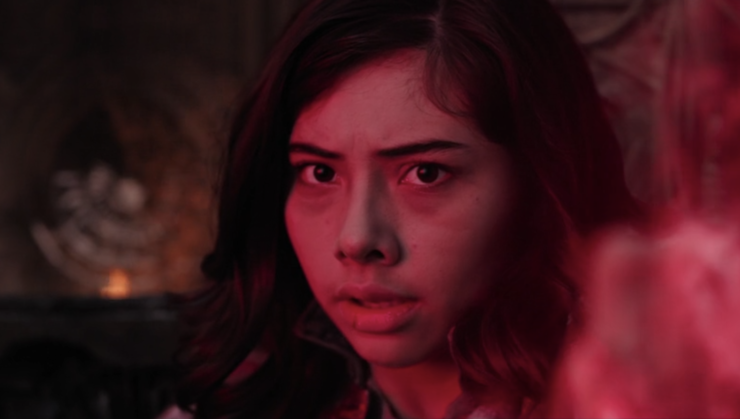
Billy and Tommy are hugely frightened by the scary lady who appears in their living room, and when their mother attacks Maximoff, and Maximoff hurts their mother, they’re even more scared. Maximoff’s attempt to convince the boys that she’s not a monster, that she would never hurt them or anyone falls on deaf ears, especially considering she’s committed a number of murders over the course of this movie alone.
Maximoff returns home, broken, and realizing what she’s become. She collapses Wundagore in on itself, giving Chavez a chance to take Wong away. Strange ends his dreamwalk and sees that the Darkhold he used is also disintegrating—Maximoff destroyed all the Darkholds in every universe.
Chavez is able to bring everyone home. Strange wishes Palmer well, and says that he loves her in every universe, while Palmer urges him not to be so afraid of falling in love.
Kamar-Taj is being rebuilt. Chavez is now training with the acolytes, and having a rough go of it. Strange asks Wong if he’s happy, and he says he’s grateful for his life, even with its tribulations.
Strange returns home, and when he goes out for a walk, collapses in pain in a crosswalk as he suddenly grows a third eye.
Some time later, he is accosted by a woman named Clea in the street. She says that he caused an incursion, and she recruits him to help her deal with it. His third eye opens and he accepts.
In the Illuminati’s universe, Pizza Poppa finally stops hitting himself and gleefully says to the camera, “It’s over!” right before the fade to black.
“I love you in every universe”
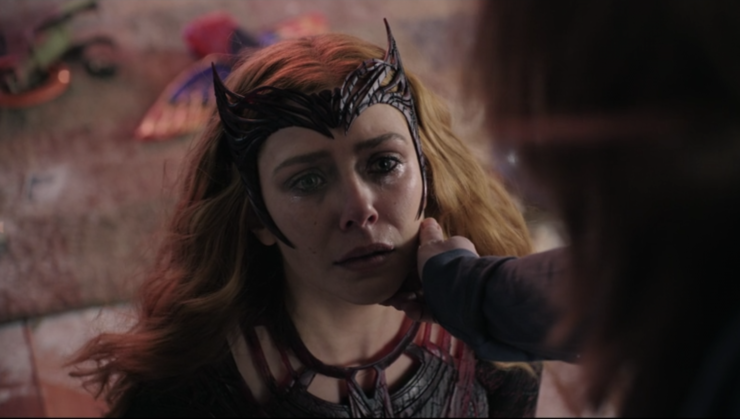
I was so looking forward to this movie, and it was such a crushing disappointment on so many levels.
One of the truisms about comics that run as long as Marvel’s (and DC’s) is that the characters will go through periods where one writer will decide to retcon or overwrite or totally change something established by prior writers. Sometimes this is a joyous process, building and expanding on the existing mythos. And sometimes it’s a slap in the face, one writer deciding, “This is stupid” and rewriting it.
This is what John Byrne did with the Vision and the Scarlet Witch on Avengers West Coast, as Byrne was of the belief that Vision was just a machine, not a sentient being, and he didn’t like him being married to the Scarlet Witch and having kids.
That story decision—to wipe out decades of character development of the Vision, to turn their children into magical creations of Mephisto—warped both characters significantly. It’s what led to turning the Scarlet Witch into a villain on more than one occasion.
Given the huge history of Marvel to pull from, Kevin Feige, Sam Raimi, and Michael Waldron decided to focus on this abuse of character perpetrated by Byrne in 1989 and continued by Brian Michael Bendis in the “Disassembled” and “House of M” storylines in the 2000s.
And it’s a really really bad reading of those comics. Because all the men responsible for this movie can think to do with Wanda Maximoff is make her the mother from hell, turning a grieving character struggling toward heroism in several previous movies and a TV series into a mass-murderer who will commit any depraved acts necessary as long as she can be a mother. Because that’s all the ladies really want, am I right, fellas?
When I first saw the movie, it wasn’t bothering me as much, because I know from the comics how foul the influence of the Darkhold can be, but this movie doesn’t do nearly enough to sell it. Maximoff’s redemption arc is weakly done, and requires her to kill herself, which is just horrible. It’s especially galling after the complex meditation on grief that was WandaVision. To have the character be so completely capital-E evil this time is disappointing, lazy, and not fair to a character who was finally given some depth on Disney+, only to be shit upon in the cinema. It’s a bad look for a cinematic universe that has already shit upon Gamora, the Black Widow, May Parker, and Jane Foster in recent movies, not to mention the sidelining of the Wasp in favor of the much-less-interesting Ant-Man and taking way too long to have a movie headlined by a woman.
It could’ve been so great to have Maximoff come back on her own, or maybe have her be manipulated by Chthon (of all the times for Marvel to not do the big CGI monster for the climax…) and then fight back against him with Strange and Chavez, or something to make her come back to being a hero at the end. But she doesn’t get even the consideration of that.
Okay, this is the ninth paragraph of this review, and I’ve hardly talked about the title character at all. Benedict Cumberbatch is never not wonderful, and while I’m still not all that thrilled with his version of Strange taking over the Snarky-White-Guy-With-A-Goatee role from Tony Stark, he’s at least very good at it. Cumberbatch doesn’t get anywhere near the credit he deserves for his comic timing. (If you ever want to be blown away, check out the BBC radio show Cabin Pressure, in which Cumberbatch voices a screwup of a pilot. He’s absolutely hilarious.) I love Palmer’s line to him early on about how he always has to be the one holding the knife, and Strange’s control-freak tendencies are beautifully examined here. It’s something that has been true of the character in all his MCU appearances—even his cameo in Thor: Ragnarok—and Waldron’s script does a good job of digging into what that means, and how it affects his personality and his performance as a superhero. We see three alternate versions of the character who pay the ultimate price for that arrogance just to drive the point home. And the question of whether or not he’s actually happy continues to be asked throughout the film, never with an adequate answer.
(Also, I was a little peeved at Strange virtually ignoring the fact that he killed his counterpart late in the film. This is the same Stephen Strange who was livid at being forced to kill one of Kaceilius’ hench-mages in his previous movie and made it clear he would not be put in that position again if at all possible.)
Having said that, there’s a line of Maximoff’s that deserved to be the theme of the film, and the movie very carefully avoids dealing with it in any meaningful manner. It’s when she throws Strange’s decision to give Thanos the time stone in his face. Strange says he did it for the greater good, but that’s a tough pill for Maximoff to swallow. Maximoff blew a hole in the head of the man she loved to stop Thanos, but because the mad Titan had the time stone, he was able to reverse time and get the mind stone anyhow. Maximoff’s line: “You break the rules and become a hero. I do it, and I become the enemy. That doesn’t seem fair.”
This is never examined, even though Strange himself uses the Darkhold also, and conveniently doesn’t suffer any of the consequences that Maximoff—or his alternate selves—do.
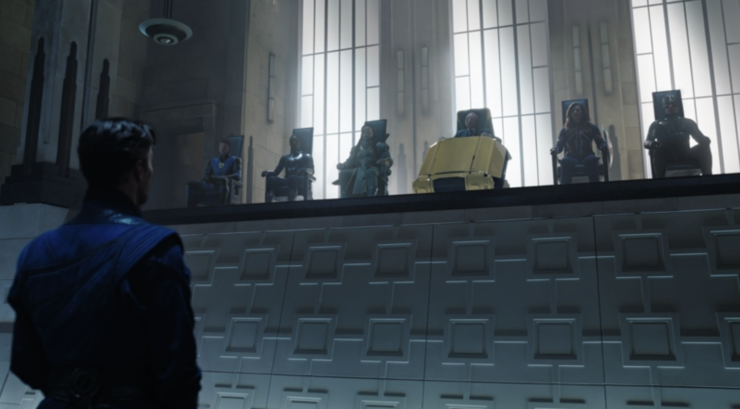
Speaking of things that are never examined, we have the Illuminati. My little fanboy heart went squee when they first appeared. I’ve wanted more of Captain Carter ever since What If…? aired, and Hayley Atwell doing the role in live action just makes me want to see more of Captain Carter, like, yesterday. I think it’s very fitting that she, in true Cap fashion, held out longest against Maximoff despite having the weakest power set. And seeing Anson Mount and Sir Patrick Stewart and Lashana Lynch was just beautiful, as was finally seeing Reed Richards (and I’m now really hoping John Krasinski plays him in the upcoming movie, though Marvel Studios is being typically cagey about that).
But then the fight started, and to call it a disaster is being far too kind. It’s especially galling because most of the fight choreography in this movie is fabulous. The battles against the monsters both in the Gap Realm and in Manhattan at the top of the movie, Maximoff’s attack on Kamar-Taj, the fight between Stranges (especially the delightful use of musical notes as weapons), and the final battle on Wundagore Mountain are all beautifully done.
Which makes it all the more galling that Raimi utterly botched the Illuminati vs. Maximoff. They just stand there, which makes sense initially when they’re trying to talk her down, but the moment Maximoff threatened Richards’ life, they should have all attacked. Instead, they stand there while Black Bolt’s mouth is sealed shut and he basically kills himself, and then they stand there some more while Maximoff rips Richards to pieces, and only then do Carter and Rambeau attack.
I have no trouble believing that Carter would eventually fall to Maximoff, but I don’t buy for a single nanosecond that Rambeau—whose power source is the same as Maximoff’s, an infinity stone (the mind stone for Maximoff, as established in Captain America: The Winter Soldier and Avengers: Age of Ultron, the space stone for Rambeau, presuming that her origin matches that of Carol Danvers in the mainline universe in Captain Marvel)—would have that much trouble defeating Maximoff. I especially didn’t buy for a picosecond that dropping a statue on her would kill her. I can, barely, accept Xavier losing to her, only because he was focused on trying to save his universe’s Maximoff. Even then, I can only just barely accept it.
And then, to add insult to injury, the deaths of these characters is never even mentioned again. For starters, this battle adds to Maximoff’s body count. We know that at least some of the folks at Kamar-Taj survived, because we saw them at the end of the movie, but at least a few of them were tossed over a cliff. This battle, however, firmly cements Maximoff as a murderer, and makes her all but irredeemable. You’d think that would be brought up at some point when she’s trying to insist she’s not a monster.
On top of that, Palmer has just watched her friends and colleagues get murdered in front of her, and she never even mentions them again at any point. It’s like she’s a character in a role-playing game who knows that the Illuminati are all non-player characters, so their deaths don’t really affect her, but in real story terms that makes her a sociopath. She’s far more worried about Strange’s love life than she is her colleagues who died.
Right after that, we have the most ridiculous sequence in the movie, as Strange, Chavez, and Palmer run from Maximoff, who is limping and in bare feet after her fight against the Illuminati. Strange, Chavez, and Palmer then stop and stand staring behind them instead of running very fast toward the Book of Vishanti, giving Maximoff a chance to catch up. What the hell?
Having said all this, there are things to like in this movie beyond Cumberbatch’s acting abilities. For one thing, he’s hardly alone in the great-acting category, as the MCU continues to be the home of superlative acting regardless of the quality of the script. Benedict Wong remains rock-steady as Wong—I love the running gag of Wong reminding Strange that it’s traditional to bow to the sorcerer supreme, with Strange not actually bowing until the very end. Xochitl Gomez is excellent as Chavez, imbuing her with both the resilience of youth and the heaviness of tragedy. Despite how horribly the character is treated, Elizabeth Olsen sells Maximoff’s pain and anger, as well as the more quotidian happiness of her counterpart in the Illuminati’s universe. Rachel McAdams gives us both a Palmer who is much more content and happy in the mainline universe and one who is harder and sadder in the Illuminati universe. Chiwetel Ejiofor is great as ever as Mordo. Both Michael Stuhlbarg and Sheila Atim do excellent work with roles that are far too brief. And it’s always fun to see Bruce Campbell…
The look of the movie is spectacular. Raimi cut his teeth on the balls-to-the-wall horror of the Evil Dead movies, and that experience is very much on display here, from the miasma of the destroyed Earth where Strange meets his corrupted counterpart to the visuals of the one-eyed squid that attacks New York to Zombie Strange and the souls of the dead attacking Maximoff to the general dark, dank atmosphere of Wundagore Mountain.
I just wish it had been in service of a better movie.
That ends this latest revival of “4-Color to 35-Millimeter.” We’ll be back at year’s end with new films—the current slate includes Thor: Love and Thunder, Black Panther: Wakanda Forever, Samaritan, and Black Adam—as well as some older ones.
Keith R.A. DeCandido is also rewatching Star Trek: Enterprise every Monday on this site. He’s currently in the middle of the second season, with “Singularity” having gone up this week.










